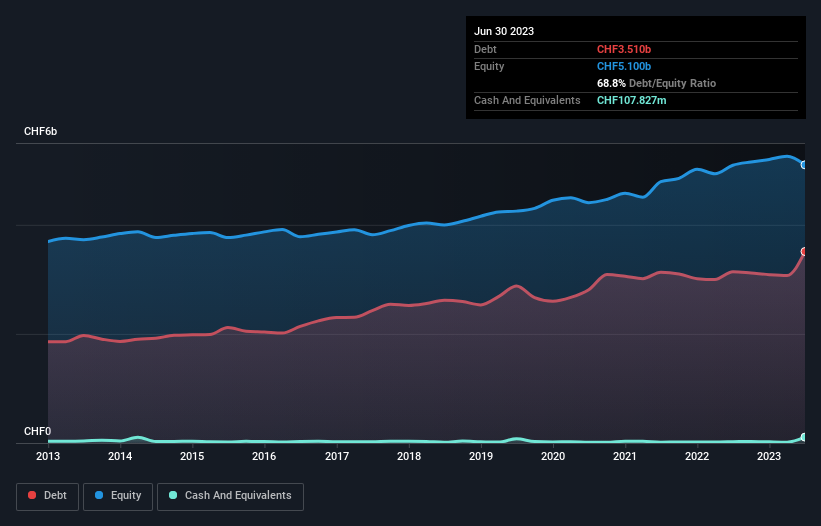
Warren Buffett famously said, 'Volatility is far from synonymous with risk.' When we think about how risky a company is, we always like to look at its use of debt, since debt overload can lead to ruin. We can see that PSP Swiss Property AG (VTX:PSPN) does use debt in its business. But should shareholders be worried about its use of debt?
Why Does Debt Bring Risk?
Debt and other liabilities become risky for a business when it cannot easily fulfill those obligations, either with free cash flow or by raising capital at an attractive price. If things get really bad, the lenders can take control of the business. However, a more usual (but still expensive) situation is where a company must dilute shareholders at a cheap share price simply to get debt under control. Of course, plenty of companies use debt to fund growth, without any negative consequences. When we think about a company's use of debt, we first look at cash and debt together.
View our latest analysis for PSP Swiss Property
How Much Debt Does PSP Swiss Property Carry?
You can click the graphic below for the historical numbers, but it shows that as of June 2023 PSP Swiss Property had CHF3.51b of debt, an increase on CHF3.14b, over one year. However, because it has a cash reserve of CHF107.8m, its net debt is less, at about CHF3.40b.

A Look At PSP Swiss Property's Liabilities
Zooming in on the latest balance sheet data, we can see that PSP Swiss Property had liabilities of CHF795.0m due within 12 months and liabilities of CHF3.87b due beyond that. On the other hand, it had cash of CHF107.8m and CHF35.3m worth of receivables due within a year. So its liabilities total CHF4.52b more than the combination of its cash and short-term receivables.
This deficit is considerable relative to its market capitalization of CHF4.92b, so it does suggest shareholders should keep an eye on PSP Swiss Property's use of debt. Should its lenders demand that it shore up the balance sheet, shareholders would likely face severe dilution.
In order to size up a company's debt relative to its earnings, we calculate its net debt divided by its earnings before interest, tax, depreciation, and amortization (EBITDA) and its earnings before interest and tax (EBIT) divided by its interest expense (its interest cover). This way, we consider both the absolute quantum of the debt, as well as the interest rates paid on it.
Strangely PSP Swiss Property has a sky high EBITDA ratio of 11.8, implying high debt, but a strong interest coverage of 20.3. So either it has access to very cheap long term debt or that interest expense is going to grow! Notably PSP Swiss Property's EBIT was pretty flat over the last year. Ideally it can diminish its debt load by kick-starting earnings growth. The balance sheet is clearly the area to focus on when you are analysing debt. But ultimately the future profitability of the business will decide if PSP Swiss Property can strengthen its balance sheet over time. So if you want to see what the professionals think, you might find this free report on analyst profit forecasts to be interesting.
Finally, a company can only pay off debt with cold hard cash, not accounting profits. So we clearly need to look at whether that EBIT is leading to corresponding free cash flow. Happily for any shareholders, PSP Swiss Property actually produced more free cash flow than EBIT over the last three years. That sort of strong cash conversion gets us as excited as the crowd when the beat drops at a Daft Punk concert.
Our View
Based on what we've seen PSP Swiss Property is not finding it easy, given its net debt to EBITDA, but the other factors we considered give us cause to be optimistic. In particular, we are dazzled with its interest cover. Looking at all this data makes us feel a little cautious about PSP Swiss Property's debt levels. While debt does have its upside in higher potential returns, we think shareholders should definitely consider how debt levels might make the stock more risky. When analysing debt levels, the balance sheet is the obvious place to start. However, not all investment risk resides within the balance sheet - far from it. Case in point: We've spotted 4 warning signs for PSP Swiss Property you should be aware of, and 1 of them makes us a bit uncomfortable.
When all is said and done, sometimes its easier to focus on companies that don't even need debt. Readers can access a list of growth stocks with zero net debt 100% free, right now.
New: Manage All Your Stock Portfolios in One Place
We've created the ultimate portfolio companion for stock investors, and it's free.
• Connect an unlimited number of Portfolios and see your total in one currency
• Be alerted to new Warning Signs or Risks via email or mobile
• Track the Fair Value of your stocks
Have feedback on this article? Concerned about the content? Get in touch with us directly. Alternatively, email editorial-team (at) simplywallst.com.
This article by Simply Wall St is general in nature. We provide commentary based on historical data and analyst forecasts only using an unbiased methodology and our articles are not intended to be financial advice. It does not constitute a recommendation to buy or sell any stock, and does not take account of your objectives, or your financial situation. We aim to bring you long-term focused analysis driven by fundamental data. Note that our analysis may not factor in the latest price-sensitive company announcements or qualitative material. Simply Wall St has no position in any stocks mentioned.
About SWX:PSPN
PSP Swiss Property
Owns and manages real estate properties in Switzerland.
Established dividend payer with proven track record.

